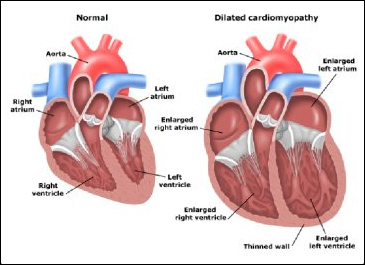
Photo: Chris Cook
Heart disease
(Atrial Fibrillation, Dilated Cardiomyopathy)
Irish Wolfhounds have a high prevalence of cardiac dysfunction, some of which is inherited. This is why it is important to test regularly from the age of two, or before being used for breeding. If you are aware of a heart condition before your dog shows symptoms, you are in the best possible position to preserve its quality of life.
The most common abnormality is atrial fibrillation (AF). Not all cases of atrial fibrillation will progress to dilated cardiomyopathy (DCM), but most will. Most Wolfhounds with DCM will progress to congestive heart failure.
If your dog is diagnosed with heart disease, this does not necessarily mean that you are about to lose your wolfhound. As with humans, many dogs are able to live relatively happy and healthy lives despite their condition when early diagnosis occurs and proper treatment is administered.
Most of the treatment options available focus upon fixing irregular heartbeats, increasing the amount of blood that the heart pumps with each beat, and reducing the build up of fluid that this condition often causes in the lungs and abdomen.
Methods of heart testing
- AUSCULTATION Listening to the heart with a stethoscope. This is where the murmurs and irregular heart rhythms can be detected.
- ELECTROCARDIOGRAM (ECG) Small electrodes are attached to the dog, which record the electric waves generated during heart activities. (It is a painless procedure but the dogs are required to lie on their right/left side.) This gives the cardiologist more information on the electrical system of the heart, if they have a fast or slow heart rate and heart rhythm problems.
- ECHOCARDIOGRAM (CARDIAC ULTRASOUND) This illustrates the anatomy of the heart, including the valves, chamber size, walls and thickness. With M-mode, the cardiologist is able to take measurements which can then be compared to the breed norm.
Any one method on its own does not guarantee that a dog is free of the condition, so a full screening is recommended. An annual test is also recommended and required if the dog/bitch is used for breeding.
Some of the heart problems associated with Wolfhounds
- ATRIAL FIBRILLATION (AF) is a heart rhythm disturbance. This is where the top chambers of the heart are out of sync with the lower chambers, and therefore less efficient. Approximately 12% of wolfhounds have atrial fibrillation. They can be asymptomatic, with no obvious problems as long as their heart rate remains within normal 80-100 beats per minute, or at least below 140 beats per minute. Some wolfhounds can be asymptomatic for a number of years, and not need medication, but they will need regular monitoring. Some wolfhounds go on to develop dilated cardiomyopathy.
- MURMUR is an abnormal heart sound produced when the blood flow into and/or out of the heart becomes turbulent. It is graded from 0 - 6 in intensity and is usually due to a leaky valve or abnormal blood vessel. It is not necessarily a cause for concern, and it can come and go, but it needs to be monitored as it might be a precursor to the start of a problem.
- DILATED CARDIOMYOPATHY (DCM) is a progressive disease of the heart muscle. The heart is unable to contract normally and the muscle stretches, the walls of the heart become thinned and the heart gets bigger and less efficient. Early diagnosis and medication can improve the condition greatly and improve the prognosis for survival.

Canine heart disease is marked by a variety of symptoms which can include the following:
- Lack of appetite
- Weight loss
- Lack of energy
- Pale gums
- Non productive coughing
- Fast and Irregular breathing i.e. over 40 breaths per minute when at rest. Check your dog's breathing rate. It's best to do this while your dog is sleeping. The normal respiratory rate for dogs is 10 to 30 breaths per minute, although dogs that are panting during vigorous activity can breathe up to 200 pants per minute (that's why you should check for your dog's breathing when he is asleep).
- Increased heart rate - it is useful to know what your dog's normal resting heart rate is. The normal heart rate of a wolfhound is between 80 to 100 bpm. And if they are excited or exercising not more than 140 bpm for long periods of time. The best area of your dog's body to check his heart rate is at the left side of his chest, at the spot where his elbow can touch if it is raised. Place your hand over this spot; if you have a stethoscope that will make it much easier for you. Count the number of beats his heart makes for 15 seconds, then multiply that number by four.
- Abdominal Swelling
- Fainting
Congestive Heart Failure
- Heart failure is a consequence of underlying heart disease.
- Heart failure happens when the heart cannot pump enough blood around to meet the needs of the dog's body, as the heart continues to work harder to pump blood, further damage can occur.
- Common symptom is fluid retention in the abdomen.
- Urgent treatment and medication is required to remove fluid build up and regulate the heart.
- Continued monitoring by veterinary surgeon is required.
Some of the drugs prescribed for heart conditions:
- FRUSEMIDE a diuretic which reduces the water retention in the body by increasing the production of urine.
- VETMEDIN opens up the blood vessels as they leave the heart and so reduces the resistance to blood circulating around the body. This reduces the work that the heart has to do. At the same time it opens up the blood vessels that return blood to the heart, reducing pressure on the heart.
- FORTEKOR an ACE-inhibitor which inhibits the hormones and compounds that constrict the blood vessels, making it easier for the heart to pump.
- LANOXIN (Digoxin) helps the heart work better and it helps control the heart rate.
- DILTIAZEM a calcium-channel blocker which works by relaxing the blood vessels so that the heart does not have to pump as hard. It also increases the supply of blood and oxygen to the heart.
- ATENOLOL beta blocker which slows the heart rate and reduces the amount of blood the heart pumps.
Many Wolfhound owners have found the use of Vetmedin, supplied by your vet or on prescription for which some vets may charge a nominal fee, helps to prolong the quality of life for their dog, above all other heart medication. It is generally accepted well, and has, on occasions brought the enlarged heart measurements back to within normal range. This does not mean that the dog is 'cured' or that it was wrongly diagnosed, it just means that the medication has worked effectively. A large number of wolfhounds have responded well to Vetmedin, together with, if necessary, an ACE-inhibitor. Whilst many wolfhounds are insured, some aren't, and the cost of medication has to be taken into consideration. If you aren't insured, Vetmedin can be obtained relatively cheaply online - 100 x 5mg tablets cost approximately £45 (Apr 2011).
Supplementation
There is no proven evidence that these supplements aid heart conditions but they are referenced in ongoing studies in both animal and human heart conditions. You should check with your vet before giving any supplements.
- Co-enzyme Q10 Thought to increase energy production in the heart muscle, increasing the strength of the pumping action.
Healthy dogs naturally produce Taurine and L-Carnitine required for heart function, but some are unable to synthesize these which can lead to a deficiency - supplementation may therefore help.
- Taurine An amino acid required for the development and function of the myocardium.
- L-Carnitine Required for the myocardial cells to produce energy and thus contract.
- Fish oil Known to have a cardioprotective effect.
- Magnesium Useful for a dog with atrial fibrillation who is NOT on medication as it is used for regulating heart r ate. If the dog is on Lanoxin (digoxin) do not give it.
- Vitamin E Thought by some to improve heart health.
There are several research programmes investigating this disease
specifically in Irish Wolfhounds and you will find several academic papers
to download in our Library section.
The IWHG has a regional heart screening scheme in the UK which encourages
breeders and pet owners alike to screen their hounds on an annual basis.



